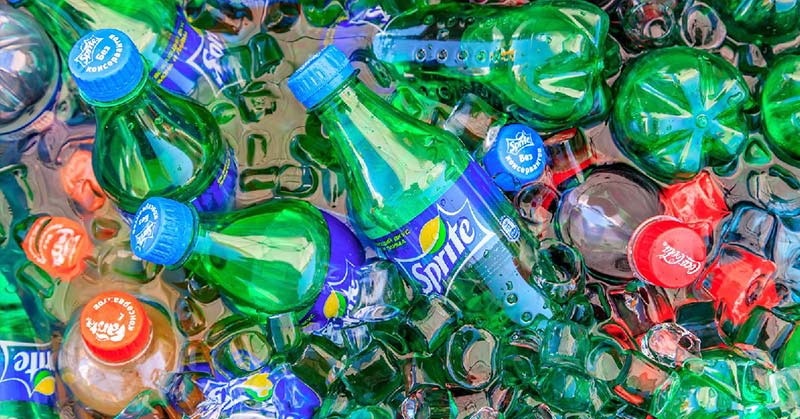Over the past several years plastic has touted to have terrible effects on the environment, and for good reason. Most plastics, unlike other materials, cannot biodegrade, and this is toxic for wildlife — especially for the oceans, where so much plastic ends up. Scientists estimate about eight million metric tons of plastic land in the oceans every year. And there are already 150 million metric tons already there. That’s the equivalent of a garbage truck dumping plastic into these waters every minute.
According to the Ocean Conservancy, by 2026, there will be 250 million metric tons in the ocean. By 2050, there will be more plastic than there are fish.
Things need to change. Only 9% of the world’s plastic is recycled, this is a problem because most types of plastics are not biodegradable and take over 400 years to decompose.
The worst offenders are single-use plastics like plastic shopping bags, straws, and food packaging. [1] That’s why people are encouraged to use reuse shopping bags and avoid plastic straws and similar products. While it’s important for every person to do his part to better the environment, this 2020 act gives the responsibility primarily to the corporations who create these plastic packages.
Related: Coca-Cola is World’s Largest Plastic Polluter for Second Year straight
The Break Free from Plastic Act of 2020
This act aims to halt plastic pollution by placing the responsibility on companies like Coca Cola or Nestle. This bill was introduced by Sen. Tom Udall and Rep. Alan Lowenthal and will hold companies like Nestlé, PepsiCo, and Coca-Cola accountable for the plastic polluters they create by obligating them to finance waste and recycling programs.
“The bill makes certain producers of products (e.g., packaging, paper, single-use products, beverage containers, or foodservice products) fiscally responsible for collecting, managing, and recycling or composting the products after consumer use,” says the bill. [2]
This act will also ban certain single-use products that cannot be recycled and stop plastic garbage being shipped overseas to other countries. It will also call for a pause on plastic production plants that have been raising concern for greenhouse emissions and poor air quality.
“The plastics pollution crisis has reached a tipping point and the American people are fed up,” said Mr. Udall.
There are some areas of the act that are less extreme and will find broader support, like making standardized labels for recycling and composting to help people sort their containers more effectively.
“It’s high time for companies to do more than just say they will recycle. Plastic pollution has become one of the greatest threats to our oceans. This bill would finally tackle the plastic crisis at its source by reducing the amount produced in the first place, and encouraging a shift to refillable and reusable alternatives,” said Oceana chief policy officer Jacqueline Savitz said in a statement. “We need to turn off the faucet, not just run for the mop.”
Related: People still want plastic bottles, says Coca-Cola
But Will This Bill Come to Pass?
“I really want to thank the Senator and the Representative for this, not ambitious, but common sense piece inside of this act. It’s very meaningful for us to maintain that human health is being impacted in our most vulnerable communities,” said Yvette Arellano, policy and research grassroots advocate at Texas Environmental Justice Advocacy Services. “It’s a link we rarely see being made.” [3]
As great as all this sounds, this act is a bit of a long shot to be fully legislated since it was introduced by two Democrats with no Republican co-sponsors. Whether this bill goes through or not, it shows incredible promise since it demonstrates the influence environmental groups have over politics. This shows incredible promise to the future of protecting the oceans and the Earth. [4]
The Break Free from Plastic Movement
According to their website: “#breakfreefromplastic is a global movement envisioning a future free from plastic pollution.” This organization does more than just spread awareness about the dangers of plastic; they work on celebrating solutions.
“We believe in a world where the land, sky, oceans, and water is home to an abundance of life, not an abundance of plastic, and where the air we breathe, the water we drink and the food we eat is free of toxic by-products of plastic pollution,” says their vision statement.
“In this world, the principles of environmental justice, social justice, public health, and human rights lead government policy, not the demands of elites and corporations.“
“This is a future we believe in and are creating together.”
If you’d like to reduce your plastic footprint by refusing single-use plastics, reusing products, and recycling, you can take the Plastic Pollution Coalition pledge here.
Keep Reading: Company Collects 80% of City’s Recyclable Plastics and Turns It All into Lumber
- Chelsea Ritschel. Why is Plastic Bad for the Environment and How Much is in the Ocean? https://www.independent.co.uk/life-style/plastic-bad-environment-why-ocean-pollution-how-much-single-use-facts-recycling-a8309311.html April 18, 2018.
- Rep. Lowenthal, Alan S. Break Free From Plastic Pollution Act of 2020. H.R.5845 https://www.congress.gov/bill/116th-congress/house-bill/5845 September 2, 2020.
- Olivia Rosane. Groundbreaking Legislation Would Help U.S. ‘Break Free From Plastic.’ EcoWatch. https://www.ecowatch.com/break-free-from-plastic-pollution-act-2645123417.html?rebelltitem=5#rebelltitem5 February 12, 2020.
- Michael Corkery. Federal Bill Seeks to Make Companies Responsible for Plastic Waste. New York Times. https://www.nytimes.com/2020/02/10/business/recycling-law.html February 10, 2020.

